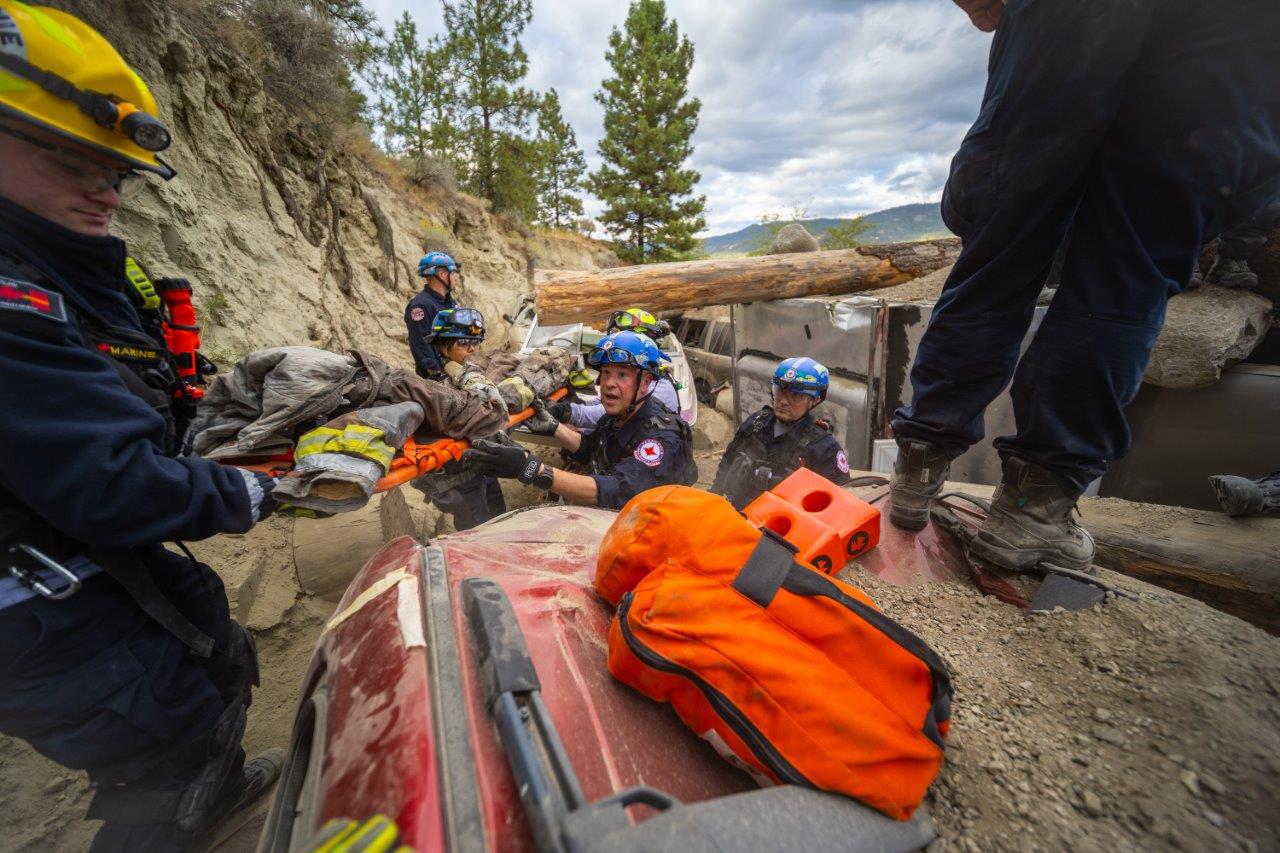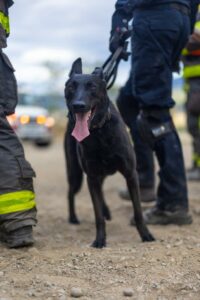Heavy Urban Search and Rescue and Water Treatment
By Christopher Radziminski, MASc, CWP, PEng, RPBio (City of Vancouver, member of the CAN-TF1 water purification team)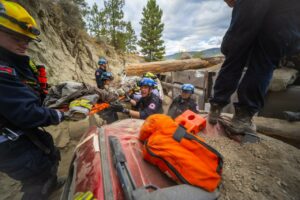
Rescue of trapped individuals by Canada Task Force 1 in a simulated landslide burying vehicles in Penticton, BC
When disasters like flooding, landslides, and building collapses exceed local response capabilities, provinces and territories can call upon one of six national heavy urban search and rescue teams. Canada Task Force 1 (CAN-TF1), based in Vancouver, BC, is one of these elite teams. The team comprises about 150 highlytrained members including firefighters, paramedics, police officers, engineers, specialized City staff, and physicians. These professionals are skilled in disciplines such as technical and canine search, technical rescue, advanced life support medicine, incident management, and more. Key to the team is self-sufficiency, so no strain is placed on a distressed community. Responding to a request for assistance, the team can establish its own base of operations with accommodations, medical facilities, power, communications and drinking water. This necessitates a small water system, and CANTF1 includes certified EOCP Small Water System Operators who train monthly with emergency water treatment and distribution equipment capable of supporting up to 150 people.
Canada Task Force 1 canine technical search in Penticton, BC for exercises
Penticton Exercise
During a full-scale disaster response exercise held 19-21 September 2023 in Penticton, BC, the CAN-TF1 small water system and its operators were challenged. The water source was water pumped from Lake Okanagan and shuttled by truck to the base of operations. Within 6 hours, the team was producing drinking water that met provincial standards and was delivered to the team’s handwashing sinks and showers (with both hot and cold water)! Laboratory analyses of the source water measured E. coli at 13 MPN/100 mL, total coliforms at 1,410 MPN/100 mL, a turbidity of 1.94 NTU, and a colour of 5.4 TCU. Conversely, laboratory analyses of the treated water revealed no detectable E. coli or total coliforms, a turbidity of 0.19 NTU, and no measurable colour. For comparison, the City of Vancouver delivered drinking water that had an average turbidity last year of 0.22 NTU. In disasters and emergency situations, laboratories are seldom available. CAN-TF1 is self-sufficient with enzyme substrate coliform testing equipment and can assess water quality in the field. Within 18 hours of treating water in Penticton, the team verified on-site that there were no detectable E. coli or total coliforms in the drinking water. To bolster the team’s quality assurance procedures, the team recently began participation in the Canadian Microbiology Proficiency Testing program. Additionally, the team used its portable instrumentation to monitor free chlorine residual, turbidity, conductivity, and total dissolved solids, and the small water system continuously measured flow and UV transmittance through its integrated meters.
Environmental Health Officers with the Interior Health Authority attended the Penticton exercise at the team’s invitation and shared feedback to further improve the Water Purification Team’s operations.
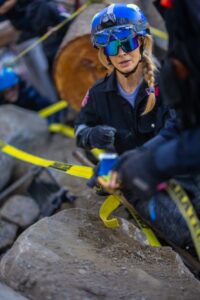 Equipment
Equipment
From a fresh-water source, CAN-TF1 can use two small water systems each with 6 stage filtration with customizable cartridges (up to 0.2 microns absolute) and UV treatment (NSF/ ANSI 55 Class A), together capable of producing 20,000 L or more of drinking water per day (depending on the source water quality). The treated water is stored in one or more 5,000 L bladders dosed to maintain a free chlorine residual of 0.2 mg/L at the furthest tap. A distribution pump directs this water to its end uses, such as personal hygiene, consumption, cooking, decontamination, and cleaning. Two on-demand water heaters supply hot water to four showers and 11 hand-washing stations. Additionally, the team has two desalinators. Through reverse osmosis, these units produce about 2,500 L per day from a saline or brackish source. These small luggage-size desalinators are used to support smaller modular deployments where a fresh-water source is unavailable, and the team’s full roster is not required.
Assistance
While CAN-TF1 hopes its assistance is never required, if disaster strikes, the team is ready to respond. In an emergency, contact the provincial emergency coordination centre at 1.800.663.3456. For more information on the team’s capabilities, please visit cantf1.com.
For other non-emergency enquiries, please contact Assistant Chief Justin Mulcahy (604.603.2480, justin.mulcahy@vancouver.ca) or Captain Eric Grootendorst (604.345.9005, eric.grootendorst@vancouver.ca).
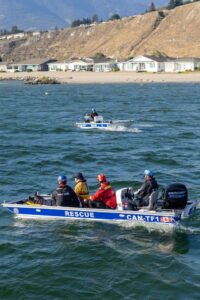
Water rescue exercise by Canada Task Force 1 in Lake Okanagan

